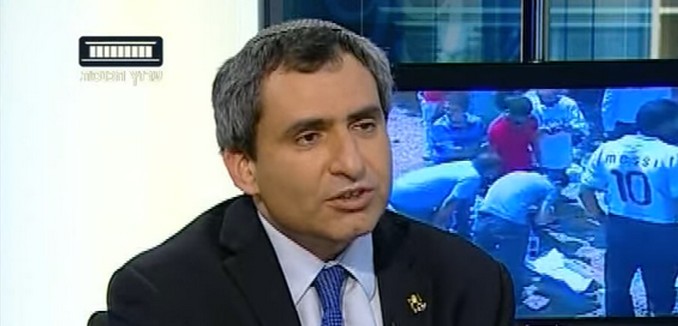An Israeli minister gave an interview to a Saudi online newspaper over the weekend, underscoring the warming ties between Israel and the Arab world in the wake of the Iranian nuclear deal last year.
Israeli Minister of Immigrant Absorption Ze’ev Elkin told a reporter from the Saudi website Elaph that Israel and the Sunni states had “shared interests,” Ynet reported Saturday.
“I’m a very realistic person, and in the current situation the ground is ready for cooperation around [shared] interests,” said Elkin, who was interviewed in his Jerusalem office. Still, he acknowledged, formal alliances between Israel and moderate Arab states, which would include formal recognition of Israel as “as a nation-state,” remain “a long way off.”
When pressed over whether there were ongoing negotiations between Israel and Arab states, Elkin responded that “It’s up to those countries whether they want relations with us to be public or hidden.” Elkin pointed out that the rise of ISIS and the ongoing rift between Sunni and Shiite countries “proves that Israel is not the root of the divisions in the Middle East.”
Elkin, who is also minister of Jerusalem affairs, told the Saudi site that travelers to Jerusalem would not see anything amiss, and that the status quo on the Temple Mount, where the al-Aqsa Mosque is located, was not being changed. “I call on everyone to visit the site and see the proof,” he added.
Israeli Foreign Ministry Director-General Dore Gold and former Israeli Ambassador to the United States Michael Oren also have given interviews to Elaph recently. They are the latest in a number of signs of rapprochement between Israel and Arab states over the past year. Last month, Israeli Prime Minister Benjamin Netanyahu said at the World Economic Forum that “nurturing these relationships that are taking place now, that could actually, with the Arab world, that could actually help us resolve the Israeli-Palestinian conflict.”
Yuval Steinitz, Israel’s minister for national infrastructure, energy, and water, recently returned from an energy conference in the United Arab Emirates, where Jerusalem recently established a diplomatic mission. Israel’s Channel 2 suggested that the real aim of the trip may have been for the two states to covertly conduct strategy meetings.
The Wall Street Journal reported last month that Israel was actively seeking to strengthen ties with Arab powers in the wake of the nuclear deal with Iran and the rise of the so-called Islamic State. In recent months, Egypt returned its ambassador to Tel Aviv, and a group of Jordanian pilots paid a “working visit” to Israel and trained closely with their Israeli counterparts during American-sponsored military exercises.
Turkish President Recep Tayyip Erdogan also recently expressed an interest in alleviating diplomatic tensions between Ankara and Jerusalem, reaching a preliminary agreement to restore relations in December. Even Sudan, a former ally of Iran, is said to be considering normalizing ties with Israel, a move that highlights the broader regional realignment taking place as concerns over Iran’s nuclear and regional ambitions grow.
Netanyahu alluded to this shift and region-wide fears about Iran’s nuclear aspirations during an interview with Andrea Mitchell of NBC in March of last year, observing that “when Arabs and Israelis agree on something it’s worth paying attention.”
[Photo: ערוץ הכנסת / YouTube ]




